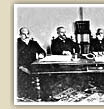|
|
 |
 |
 |
 |
 |
 |
 |
 |
 |
 |
|
The Committee that arrived in the island, in order (among other things) to put an end
to the revolt of Therissos,
|

recognized, on the one hand, the necessity of Union and, on the other hand, deemed George
uneligible even for the provisional settlement of the internal political affairs of Crete.
Finally, in 1906 the Powers brought in a series of reforms that meant both the expansion
of foreign ties with Greece (appointment of the High Commissioner by the Greek King after
the endorsement of the Powers) and the abolishment of the state of autonomy of the bonds
of international control, and, also a programme of internal reconstruction, the major element being the
revision of the constitution and the establishment of parliamentary practice. Prince George
was replaced by the moderate and experienced statesman, Alexandros Zaimis.
The period following these developments was a relatively calm one and many internal organizational
changes occurred. As concerns the issue of Union, in October 1908 the Cretan Assembly challenged the legal
authorities and formed a five-member Executive Committee that would govern in the name of the Greek King
according to the laws of the Greek state. The Declaration of Union would arouse the opposition of the Sublime
Porte and the Great Powers. European troops, however, soon evacuated the island. The Greek government
reacted negatively to the one-sided declaration of Union,
|
 |

fearing an international involvement and a new
war with Turkey, which she was determined to avoid.
In 1912, the Cretan deputies expressed their wish to participate in the Greek Assembly, considering
that in this way, after the one-sided declaration of the Union in 1908, they would contribute
to its ratification and gain international recognition. Venizelos categorically
refused. Nevertheless, in March 1912 along with elections in Greece,
elections were held in Crete to elect representatives for the Greek Assembly.
When the latter (despite government efforts to give them the cold shoulder in Athens) tried to
enter Parliament, Venizelos did not hesitate to forbid their entrance, in order
to avoid an international incident, causing apparently a huge outburst of public
emotion. He had been consistent in his policy of avoiding tension with Turkey prior to
the completion of preparations for successful confrontations.
With the declaration of the First Balkan War, Greece immediately accepted the Union that had
already been declared by the Cretans in 1908. With article 4 of the Treaty of London (30 May 1913)
that terminated the First Balkan War, in which Cretan soldiers had participated, the Sultan
renounced all claim of sovereignty over Crete.
|
 |
 |
|
